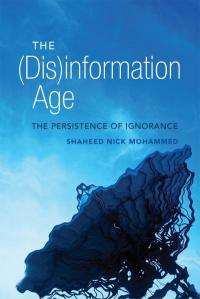Technology's power to misinform dims utopian hopes

(Phys.org) -- The ability for computer technology to automatically create a society of smart, tolerant citizens may be more hype and hope than reality,according to a Penn State Altoona researcher.
"We have to rethink some of our most common assumptions about modern life and, specifically, we need to rethink assumptions that the information age will naturally lead to a society that is intelligent and scientifically literate," said Shaheed Nick Mohammed, associate professor of communications. "In fact, we may have moved backwards in many respects."
Mohammed, who published his critique on information technology and new media in the book, "The (Dis)information Age: The Persistence of Ignorance" (Peter Lang Publishing, 2012), said that more information and more communication technologies may not necessarily lead to the intelligent use of that information.
With the rapid increase in news and information distributed by such technologies as the Internet and mobile phones, people are struggling to tell the difference between facts and opinion, entertainment, and outright disinformation, according to the researcher.
"In the 1960s we were talking about information overload when we had 12 television channels," Mohammed said. "And now we are facing an exponential change in that information overload."
In addition to the amount ofinformation, Mohammed said that the number of tools people use to access information has increased. The Internet, satellite television, smart phones and social networks are some examples of tools people now use to receive news and information that were unavailable just a few decades ago.
Mohammed said that people who praise the role of information technologies and social networks in fostering democratic movements, like Iran's Green Revolution and Arab Spring, often ignore how the technology has been used to suppress those movements.
In 2008 the Egyptian government arrested 500 Egyptian activists, often using Facebook as a way to identify activist leaders, Mohammed said.
Oppressive governments also use social networks to spread disinformation. For example, Twitter accounts managed by government officials are used to spread fake videos and footage of pro-government rallies.
Hate groups and extremist religious factions are also using information technologies to spread both information and disinformation.
As corporations increasingly try to make money from information, the researcher said that economic pressure is blurring the line between news and entertainment.
"There is so much information out there that companies are trying to get the most attention," said Mohammed. "This leads to a concession to the grandiose and sensationalization."
Mohammed said he does not advocate eliminating information technologies completely -- a Luddite response -- but that citizens and scholars must begin to critically question and assess information sources and tools.
"It's about people and culture," said Mohammed. "Information and technology are just tools and tools remain tools."
Mohammed said that the transition to an information age is similar to the change to society caused by industrial age technology.
"We are just at the beginning of the information age and we are just starting to ask the questions," Mohammed said. "Just like we learned to adapt to the industrial age, we have to adapt to the information age."
Provided by Pennsylvania State University


















